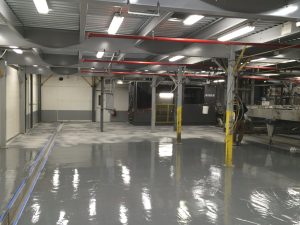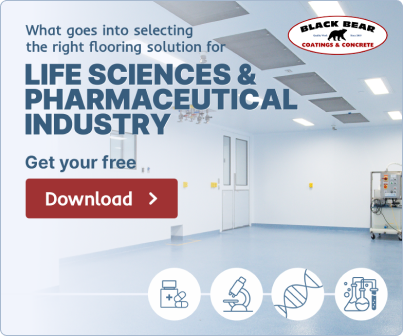
The Differences Between Solvent Based vs Solids Based vs Water Based Epoxy:
Solids-based Epoxy Coatings
A solids-based epoxy is the most basic kind: simply the resin with some hardener, without any water or solvents added. Solids-based epoxy creates the thickest floor coating, as well as usually being the strongest option. This makes it a good choice for situations like warehouses which will see a lot of heavy-duty use.
The big drawback is that solids-based epoxy has a very short pot life. A batch has to be applied within half an hour or so before it’s too solidified to spread. This makes it significantly more expensive to install.
Water-based Epoxy Coatings
The solution to extending epoxy’s pot life is to put in additives that are slow to evaporate, like water, so it doesn’t start actively hardening until most of the additives are gone. The big advantage to using water as the additive is that it’s non-toxic, and doesn’t create any fumes. This makes it safer and easier to work with.
Unfortunately, the end result is the weakest of the epoxy floor types. It’s really only suitable for light office-style work, or situations like laboratories where they need to be extra-stringent about keeping VOCs and other contaminants away from the work environment.
Solvent-based Epoxy Coatings
Solvent-based epoxy also works on the principle of adding extra material which needs to evaporate. Unlike water-based solutions, adding solvent to the epoxy only reduces its strength slightly, and it’s also more resistant to petroleum contamination in the concrete. Therefore, it’s viewed as the best all-around solution for easy-to-install epoxy coatings, particularly in machine shops.
However, this comes with a tradeoff: the solvent is a VOC which will create potentially-harmful fumes while being installed. In some cases, local environmental regulations may even prevent the use of solvent-based epoxy.
Related: Top 5 Reasons to Use Epoxy Flooring for your Business
Solvent Based vs Solids Based vs Water Based Epoxy: Who Can Help You Decide?
So which epoxy option is best for your organization between solvent based vs solids based vs water based epoxy? Black Bear Coatings & Concrete, the Northeast’s leading partner for commercial floors and concrete coatings, can help you determine which product is more ideal for your business. Our unique approach includes an on-site evaluation of spaces and a thorough understanding of how a space is to be used. This allows us to reverse-engineer a solution based on the stressors of the environment and provide businesses with longer-lasting products. This will also help to indicate which type of epoxy will be most ideal for your individual needs. Check more on epoxy flooring.
Contact Black Bear to learn more about our epoxy, urethane, and polished concrete solutions, and see why more brands and businesses trust us to design better commercial and industrial flooring, and flawless installations.



